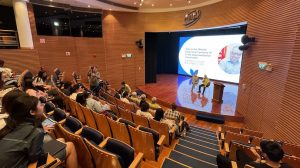IFTM’s Prof. Ren Lianping and Dr. Ma Caiwei, from Shanghai Polytechnic University, researched the appeal behind ‘blind box’ tourism products. Their study explored consumer behaviour, recommending promotion of this type of product for its mystery and allure
The ‘blind box’ concept has made its way into the tourism industry, with numerous businesses in China now employing it as a marketing tool. A study featuring IFTM scholar Prof. Ren Lianping has delved into this phenomenon, concluding that it is “most appealing” to consumers aged 19 to 39 due to their heightened curiosity about such offerings. The study also revealed that low- and mid-income consumers were more inclined to purchase blind box tourism products.
According to the research, those aged between 19 and 39 “care about their consumption experience,” and industry practitioners offering blind box tourism products “should prioritise attracting and holding the attention of this particular group.”
Blind boxes originally refer to products with identical external packaging but distinctive features inside, hidden from buyers until purchase. The primary idea behind the blind box concept is intentionally to withhold information from the potential consumer – and so pique their curiosity and drive their motivation to purchase the item.
Applied to tourism, the concept has given rise to offers such as ‘blind-box plane ticket’ products, allowing the buyer to choose the departing airport, but without knowledge of the destination city, the departure day, or even the departure time, up to the point of purchase. Similar concepts have been developed for hotel stays, food and beverage vouchers, and entry tickets for various attractions.
IFTM’s Dr. Ren and Dr. Ma Caiwei, a scholar from Shanghai Polytechnic University, collaborated on the research, funded by the Shanghai Innovation Center of Reverse Logistics and Supply Chain, affiliated with Shanghai Polytechnic University.
Their findings were published in the academic paper “Planning the unplannable—How blind box tourism boosts purchase intentions”, featured in the Journal of Vacation Marketing last year. (Click here for access to full paper.)
The work suggested that since 2021, the ‘blind box’ concept had become a popular travel and tourism marketing tool in China, initially adopted by travel companies to revitalise the industry amidst the COVID-19 pandemic.
In their study, Dr. Ren and Dr. Ma explored the behavioural psychology of consumers in terms of whether they embraced or avoided blind box tourism products. They conducted an online survey in China that garnered 343 valid responses. The research covered various aspects of blind box tourism products, including consumers’ purchase intentions and the roles of curiosity, novelty, and mystery in the success of this type of product.
Based on their results, the authors suggested several practical implications for the tourism industry. For instance, packaging blind box tourism products should be done in a way that highlights the product as mysterious and as well as appealing, to arouse curiosity among consumers. However, Dr. Ren and Dr. Ma cautioned that the packaging should not generate a feeling of loss, namely promoters should try to make sure the content does not fall below consumer expectations. The product’s packaging should instead induce excitement.
To enhance promotion campaigns, the authors recommended including testimonials from previous users and incorporating more value-added content in the package to stimulate curiosity and boost motivation for repeat purchases. They also suggested marketing such products in a variety of combinations, such as ‘attraction plus hotel in one city’, to enrich blind-box offerings and meet a variety of demands.
Dr. Ren and Dr. Ma highlighted how blind box tourism products provide a “good example of an innovative purchase experience via social media.” Consumers, they explained, are not only curious about, and get a thrill from, the unknown, but also enjoy showcasing their lives on social media through interaction with these types of commercial activity. This aligns with the idea that consumers also derive value from the attention paid to the questions and emotions evoked by the blind box concept, rather than just from the material payoffs.
Editor: IFTM Public Relations Team









